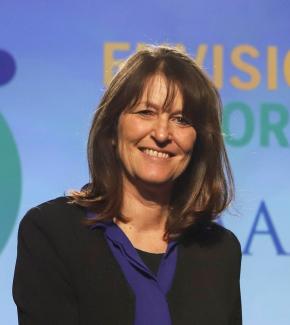
Ph.D., Stanford University
Areas: Gender, Global and Transnational Sociology, Work and Occupations, Social Inequality, Applied Quantitative Methods
Maria Charles is Distinguished Professor of Sociology at the University of California – Santa Barbara (UCSB), fellow of the American Academy for Advancement of Science, and elected member of the Sociological Research Association. For her cross-national comparative work on educational and occupational gender segregation, she is the cowinner of the American Sociological Association’s 2011 Sex and Gender Section Distinguished Article Award and the 2005 Max Weber Award for Distinguished Scholarship.
A leading comparative gender scholar, Charles investigates how and why patterns of gender inequality and popular understandings of gender vary across geographic contexts and socio-demographic groups. Recent projects with graduate students and other collaborators explore the variable gender composition of STEM fields within and across countries, gender beliefs in Africa and the Middle East, and effects of cultural stereotypes on perceptions, aspirations, and the gendering of career outcomes. Supported by grants from the National Science Foundation, Russell Sage Foundation, and Spencer Foundation, Charles’ research has appeared in major national and international outlets, including American Sociological Review, American Journal of Sociology, Demography, Social Forces, European Sociological Review, Gender & Society, and Stanford University Press.
Maria Charles holds PhD and MA degrees in Sociology from Stanford University, and BAs in Political Science and Environmental Studies from University of California – Santa Barbara. Before joining the faculty at UCSB, she was a postdoctoral scholar at the Swiss Federal Institute for Technology in Zurich, and Professor of Sociology at University of California – San Diego. At UC Santa Barbara, she has served as chair of the Sociology Department (2012-2016), director of the Broom Demography Center (2016-2022), and faculty affiliate of the Feminist Studies Department. She is an award-winning teacher and mentor of graduate students.
Selected publications
“Minding the Gap(s): The Uneven Gendering of Engineering and Computing Work Across Europe.” International Journal of Comparative Sociology, 2025, forthcoming. DOI 10.1177/00207152251372850
“Is it Really a Paradox? A Mixed-Methods, Within-Country Analysis of the Gender Gap in STEM Education,” with Islam Abu-Asaad, Yariv Feniger, Gila Manevich-Malul and Halleli Pinson. Social Sciences 14:238, 2025.
“Complicating Patriarchy: Gender Beliefs of Muslim Facebook Users in the Middle East, North Africa, and South Asia,” with Roger Friedland, Janet Afary, and Rujun Yang. Gender & Society 37:91-123, 2023.
* “It’s Not Only About the Veil: Multifaceted Gender Beliefs in Six Muslim-majority Countries.” Gender & Society Blog, January 5, 2023.
“Traditional Asians? Race, Ethnicity, and Gender Policy Attitudes in the United States,” with Rujun Yang. RSF: The Russell Sage Foundation Journal of the Social Sciences 7:130–53, Special issue on Asian Americans and the Immigrant Integration Agenda, 2021.
“Gender Attitudes in Africa: Liberal Egalitarianism across 34 Countries.” Social Forces 99:86-125, 2020.
"Gender Stereotypes, Gendered Self-Expression, and Gender Segregation in Fields of Study: A Q&A with Professor Maria Charles." Harvard GenderSci Lab blog, 2020.
“Trends in Support for Stay-at-Home Mothering,” with Jason Budge. Contexts 19(2):71-3, 2020.
“Gender and Occupational Segregation,” with Yan Ling Anne Wong. Pp. 305-325 in Companion to Women’s & Gender Studies, Nancy A. Naples, ed. Hoboken, NJ: Wiley, 2020.
“An Inegalitarian Paradox: On the Uneven Gendering of Computing Occupations around the World,” with Tiffany Chow. Pp. 25-45 in Cracking the Digital Ceiling: Women in Computing Around the World. Carol Frieze and Jeria Quesenberry, eds. Cambridge University Press, 2019.
Gender and STEM: Understanding Segregation in Science, Technology, Engineering and Mathematics, edited with Sarah Thébaud. Basel: MDPI Press, 2018. Also published as a special journal issue of Social Sciences.
“Segregation, Stereotypes, and STEM,” with Sarah Thébaud. Social Sciences 7(7):1-19, 2018.
“Venus, Mars, and Math: Gender, Societal Affluence and Eighth Graders’ Aspirations for STEM” Socius 3:1-16, 2017.
“Gender Ideologies,” with Anna Chatillon+, Karen Bradley. Pp. 217-226 in Handbook of the Sociology of Gender, Barbara J. Risman, Carissa M. Froyum, and William J. Scarborough, eds. NY: Springer, 2018.
“Is There a Caring Class? Intergenerational Transmission of Care Work,” with Corrie Ellis and Paula England. Sociological Science 2:527-43, 2015.
“Who Likes Math Where? Gender Differences in Eighth-graders’ Attitudes around the World,” with Bridget Harr, Erin Cech and Alexandra Hendley. International Studies in Sociology of Education 24:85-112, 2014.
“The Local Joneses: Household Consumption and Income Inequality in Large Metropolitan Areas,” with Jeffrey D. Lundy. Research in Social Stratification and Mobility 34:14-29, 2013.
“What Gender is Science?” Contexts 22-28, Spring 2011.
“A World of Difference: International Trends in Women’s Economic Status.” Annual Review of Sociology 37:355-72, 2011.
“Beliefs about Maternal Employment,” with Erin Cech. Pp. 147-74 in Dividing the Domestic: Men, Women, and Household Work in Cross-National Perspective, edited by Judith Treas and Sonja Drobni?. Stanford, CA: Stanford University Press, 2010.
“Indulging Our Gendered Selves? Sex Segregation by Field of Study in 44 Countries,” with Karen Bradley. American Journal of Sociology 114:924-76, 2009.
* Distinguished Article Award, American Sociological Association Section on Sex and Gender.
* Distinguished Scholarship Award Honorable Mention, Pacific Sociological Association.
“Culture and Inequality: Identity, Ideology, and Difference in ‘Post-ascriptive Society’.” Annals of the American Academy of Political and Social Science 619:41-58, 2008.
Occupational Ghettos: The Worldwide Segregation of Women and Men, with David B. Grusky. Stanford University Press. 2004 (2005 in paperback).
* Max Weber Award for Distinguished Scholarship, American Sociological Association Section on Organizations, Occupations, and Work.
“Deciphering Sex Segregation: Vertical and Horizontal Inequalities in Ten Countries.” Acta Sociologica 46:267-87, 2003.
“Equal but Separate? A Cross-National Study of Sex Segregation in Higher Education,” with Karen Bradley. American Sociological Review 67:573-599, 2002.
“The Context of Women’s Market Careers: A Cross-National Study,” with Marlis Buchmann, Susan Halebsky, Jeanne Powers, and Marisa Smith. Work and Occupations 28:371-96, 2001.
* Rosabeth Moss Kanter Award for Excellence in Work-Family Research, 2002 Nominee.
“Divisions of Labour: Social Groups and Occupational Allocation.” European Sociological Review 16:27-42, 2000.
“The Past, Present, and Future of Sex Segregation Methodology,” with David B. Grusky. Demography 35:497-504, 1998.
"Models for Describing the Underlying Structure of Sex Segregation," with David B. Grusky. American Journal of Sociology 100:931-71, 1995.
"Cross-National Variation in Occupational Sex Segregation." American Sociological Review 57:483-502, 1992.